The past year provided an outstanding time of growth and success at Northwestern University Feinberg School of Medicine.

“The medical school had an exceptional year in 2013,” said Eric G. Neilson, MD, vice president for medical affairs and Lewis Landsberg Dean. “We enhanced the strength of the Northwestern Medicine brand by integrating our clinical organization, established a number of innovative institutions and centers, made great strides in medical science and recruited more high quality faculty. I anticipate another year of groundbreaking research, institutional growth and academic excellence as we begin 2014.”
Last year was a remarkable year for the medical school, marked by a number of great accomplishments. As we start 2013, I anticipate continued expansion of our research initiatives and academic programs, and the addition of a number of new leaders in medicine as we continue on our path to becoming a premier academic medical center under the Northwestern Medicine brand.
Eric G. Neilson
Dean of the Medical School
The following stories highlight some of Feinberg’s best moments from 2013:
New Method First to Predict Brain Cancer Outcome
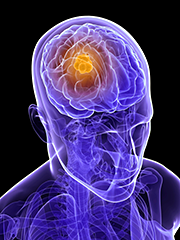
In January, Northwestern Medicine researchers developed a new method to predict an individual patient’s brain tumor growth. This tool could be used by physicians to quickly identify how well a tumor responds to a particular therapy. Senior author Kristin Swanson, PhD, professor and vice chair of research for Neurological Surgery, said the method will advance brain tumor treatment by helping to identify effective treatments and enabling clinicians to optimize treatment plans on a patient-by-patient basis.
New Way to Kill Lymphoma Without Chemotherapy Uses Golden Nanoparticles
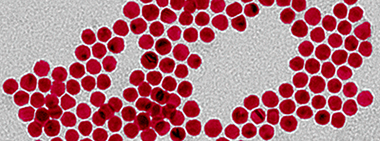
A new study by C. Shad Thaxton, MD, assistant professor in Urology, and Leo Gordon, MD, Abby and John Friend Professor of Oncology Research, showed that synthetic HDL nanoparticles killed B-cell lymphoma, the most common form of the disease, in cultured human cells and inhibited human B-cell lymphoma tumor growth in mice. The study was published in the journal Proceedings of the National Academy of Sciences.
Northwestern Medicine to Invest $1B in Research
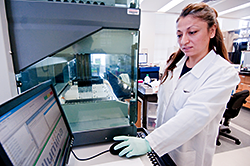
Leaders of Northwestern Medicine, comprising Northwestern University Feinberg School of Medicine, Northwestern Medical Faculty Foundation and Northwestern Memorial HealthCare, made a commitment of more than $1 billion toward creating a leading medical research enterprise on Northwestern University’s Chicago campus. Constructing additional research space and attracting top scientists to Northwestern will create more opportunities to discover breakthroughs in such areas as neuroscience, heart disease, diabetes and cancer.
Clements to Chair Family and Community Medicine
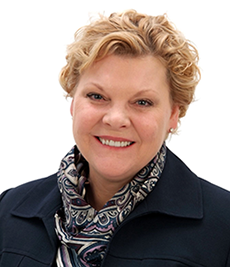
In February it was announced that Deborah Clements, MD, nationally recognized for her contributions to education policy, was joining Feinberg as a professor and chair of the Department of Family and Community Medicine. As chair, Dr. Clements leads the department in the creation of clinical and educational programs that will have substantial national impact on primary care and oversees Feinberg’s involvement in the residency program at Erie Family Health Center.
Acclaimed Surgical Couple Coming to Feinberg
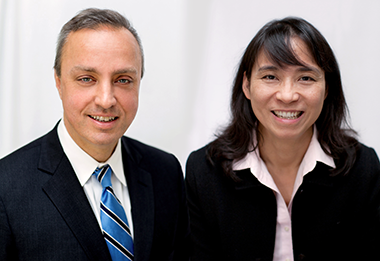
Andrew T. Parsa, MD, PhD, an internationally-renowned neurosurgeon specializing in complex tumors of the brain and spine, was named the Michael J. Marchese Professor and chair of the Department of Neurological Surgery. Dr. Parsa’s research on brain tumor immunology has provided landmark insights into the disease, including the identification of a novel link between oncogenesis and immune-resistance in brain tumors. His wife, Charlotte Shum, MD, a hand and upper extremity specialist, was named associate professor of Orthopaedic Surgery.
Northwestern Partners in Consortium to Develop New Ways to Treat Macular Degeneration
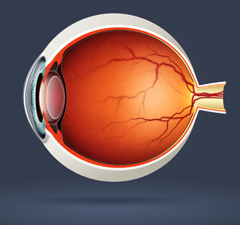
Northwestern University scientists became part of a multi-institutional, interdisciplinary consortium that aims to develop new treatments for exudative age-related macular degeneration (AMD). Awarded a $6.2 million grant over five years from the National Eye Institute, the consortium will leverage its diverse scientific expertise to characterize and test novel therapies for exudative AMD in animal models using cutting-edge approaches that combine signal transduction and physiology, chemistry, nanoparticles and novel imaging technology.
New Chemo Drug Found to be Gentler on Fertility, Tough on Cancer
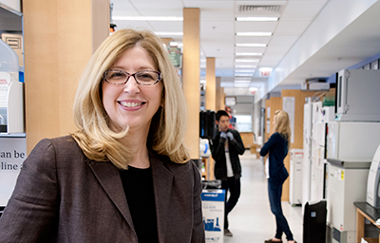
In March, Northwestern Medicine scientists developed a new, gentler chemotherapy drug that is less toxic to fertility. Consisting of nanoparticles, this is the first cancer drug tested while in development for its effect on fertility using a novel in vitro test. “Our overall goal is to create smart drugs that kill the cancer but don’t cause sterility in young women,” said Teresa Woodruff, PhD, a co-principal investigator of the study and chief of Fertility Preservation.
Clinical Operations Announce Plans to Integrate
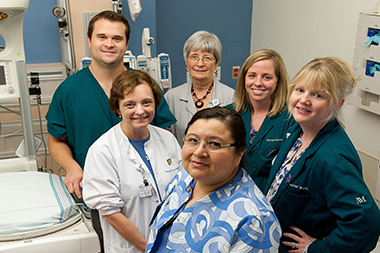
Northwestern University Feinberg School of Medicine, Northwestern Memorial HealthCare, Northwestern Medical Faculty Foundation and Northwestern Memorial Physicians Group announced plans in March to integrate their clinical operations under one unified organization that will be branded Northwestern Medicine. “Integrating our clinical organizations will allow us to maximize resources to support bold new endeavors in treatment, research and academic pursuits,” said Eric G. Neilson, MD, vice president of Medical Affairs and dean of Feinberg, who chairs the NMG Board of Directors.
This connection from brain to muscles might someday be used to help patients paralyzed due to spinal cord injury perform activities of daily living and achieve greater independence.
Latest Rankings Keep Feinberg among Elite Medical Schools
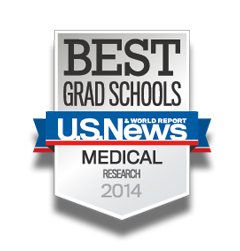 The medical school strengthened its position among the top research-oriented institutions, maintaining its spot at No. 18 on the 2014 U.S. News & World Report rankings. Among specialty rankings, women’s health is 11th, AIDS 14th and pediatrics 14th. “As Feinberg’s scientific scope and research footprint grows, the strength of our faculty and staff will continue to carry us toward the top-tier of medical research and education,” said Eric G. Neilson, MD, vice president for medical affairs and Lewis Landsberg Dean.
The medical school strengthened its position among the top research-oriented institutions, maintaining its spot at No. 18 on the 2014 U.S. News & World Report rankings. Among specialty rankings, women’s health is 11th, AIDS 14th and pediatrics 14th. “As Feinberg’s scientific scope and research footprint grows, the strength of our faculty and staff will continue to carry us toward the top-tier of medical research and education,” said Eric G. Neilson, MD, vice president for medical affairs and Lewis Landsberg Dean.
Building a Human Kidney
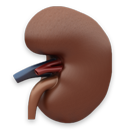 Within the next few decades, getting a new kidney could be as simple as having a doctor order an engineered organ that will be developed in the laboratory with a patient’s own cells. In April, international experts gathered at Feinberg for a brainstorming session on kidney regeneration. The conference, “Building a Kidney: From Stem Cells to Organ,” was sponsored by Northwestern University, the Simpson-Querrey Center for Regenerative Nanomedicine at IBNAM and Cellular Dynamics International.
Within the next few decades, getting a new kidney could be as simple as having a doctor order an engineered organ that will be developed in the laboratory with a patient’s own cells. In April, international experts gathered at Feinberg for a brainstorming session on kidney regeneration. The conference, “Building a Kidney: From Stem Cells to Organ,” was sponsored by Northwestern University, the Simpson-Querrey Center for Regenerative Nanomedicine at IBNAM and Cellular Dynamics International.
Narahashi, Founding Father of Modern Pharmacology, Remembered for Six Decades of Research
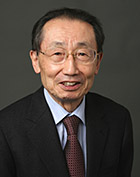
Known as a leader in neurotoxicology and the father of cellular neuropharmacology, Toshio Narahashi, PhD, John Evans Professor of Pharmacology, was remembered for his dedication to mentoring, scientific accomplishments and well-developed sense of humor. Narahashi joined Feinberg in 1977, assuming the chairmanship of the Department of Molecular Pharmacology and Biological Chemistry. During his 17 years as chair, he elevated the department to one of the most active in the country.
Feinberg, RIC Announce Expanded Collaboration
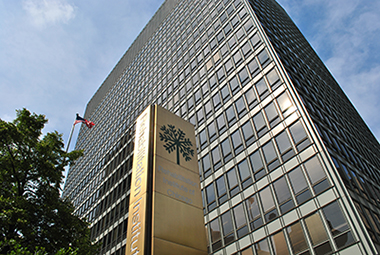
A new agreement between the medical school and the Rehabilitation Institute of Chicago (RIC) establishes the RIC as the clinical venue for Department of Physical Therapy and Human Movement Sciences faculty, expands clinical education experiences for students, creates a joint Northwestern-RIC physical therapy residency program and allows Feinberg and RIC researchers the ability to better pursue investigative questions and develop innovative science-based devices, technologies and treatments.
The Class of 2013 Celebrates Commencement

The 161 members of the Class of 2013 celebrated their commencement ceremony with friends, family and faculty at Chicago’s Navy Pier Grand Ballroom on May 23. The commencement speaker, Elizabeth G. Nabel, MD, president of Brigham and Women’s Hospital and professor of medicine at Harvard Medical School, congratulated students. “Class of 2013, you are the future of medicine. As you cross the next thresholds of your life, I wish you all the best,” she said.
Honors Day Tradition Introduced at Feinberg
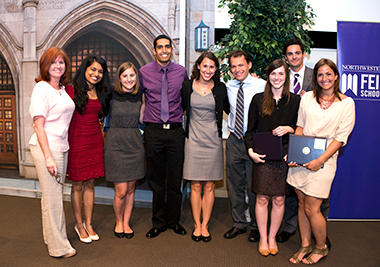
Honors Day was created to recognize outstanding faculty and students. Seventeen awards were presented to students and faculty at the inaugural event in May. Keynote speaker Gaurava Agarwal, MD, instructor in Psychiatry and Behavioral Sciences, said he felt privileged to have the opportunity to celebrate these students. He spoke about the moment he gave up the stethoscope to specialize in psychiatry and the importance of the trust and confidence of patients.
New Institute Will Boost First-in-Human and Early-Phase Studies for Cancer Patients
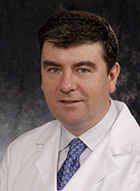
Northwestern University established a major new initiative in May, the Developmental Therapeutics Institute, with an initial $10 million investment. Led by Frank Giles, MD, the institute brings more early-stage clinical studies of new anti-cancer approaches to Chicago. This program aims to develop much needed new therapies for cancer and other diseases based on Northwestern’s preclinical and translational research by scientists on the Evanston and Chicago campuses.
IPHAM Launches Center for Community Health
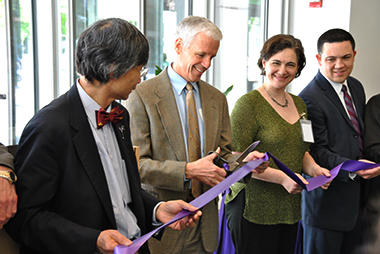
As one of eight centers in the Institute for Public Health and Medicine, the Center for Community Health facilitates multi-disciplinary, partnered efforts to envision and investigate a frontier of medicine that integrates public policy and population health. “The CCH offers a bold new vision for engagement that will enable Northwestern to emerge rapidly as a national epicenter for research that improves the health and healthcare of Chicago and beyond,” said Ronald Ackermann, MD, MPH, director of the center.
Faculty Elected to Prestigious Societies at Joint Meeting
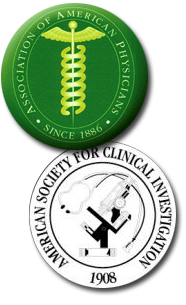 In May, Xunrong Luo, MD, PhD, associate professor in Nephrology, Microbiology-Immunology and Surgery-Organ transplantation; Gokhan M. Mutlu, MD, associate professor in Medicine-Pulmonary; and Puneet Opal, MD, PhD, associate professor in Neurology and Cell and Molecular Biology, joined the more than 3,000 physician-scientists elected to the American Society for Clinical Investigation. Susan Quaggin, MD, Charles Horace Mayo Professor of Medicine, director of the Feinberg Cardiovascular Research Institute and chief of the Division of Medicine-Nephrology, joined more than 1,200 active members in the Association of American Physicians.
In May, Xunrong Luo, MD, PhD, associate professor in Nephrology, Microbiology-Immunology and Surgery-Organ transplantation; Gokhan M. Mutlu, MD, associate professor in Medicine-Pulmonary; and Puneet Opal, MD, PhD, associate professor in Neurology and Cell and Molecular Biology, joined the more than 3,000 physician-scientists elected to the American Society for Clinical Investigation. Susan Quaggin, MD, Charles Horace Mayo Professor of Medicine, director of the Feinberg Cardiovascular Research Institute and chief of the Division of Medicine-Nephrology, joined more than 1,200 active members in the Association of American Physicians.
Neon Exposes Hidden ALS Cells, Helps Scientists Study Why They Die
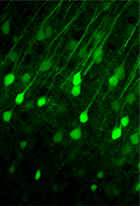 In a preclinical study, Hande Ozdinler, PhD, assistant professor of Neurology, isolated the motor neurons in the brain that die in amyotrophic lateral sclerosis and dressed them in a green fluorescent jacket. As a result, scientists will now be able to track what goes wrong in these cells to cause their death and be able to search for effective treatments.
In a preclinical study, Hande Ozdinler, PhD, assistant professor of Neurology, isolated the motor neurons in the brain that die in amyotrophic lateral sclerosis and dressed them in a green fluorescent jacket. As a result, scientists will now be able to track what goes wrong in these cells to cause their death and be able to search for effective treatments.
Disease Specialist to Head Neurology
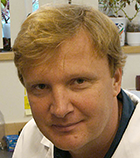
Dimitri Krainc, MD, PhD, a distinguished investigator who has had an impact in the area of neurodegenerative diseases, was named Aaron Montgomery Ward Professor, chair of the Ken and Ruth Davee Department of Neurology and director of the newly established Center for Rare Diseases. Dr. Krainc investigates molecular pathways in the causes of neurodegeneration to develop therapies for Huntington’s, Parkinson’s and related diseases.
Promising New Alzheimer’s ‘Drug’ Halts Memory Loss
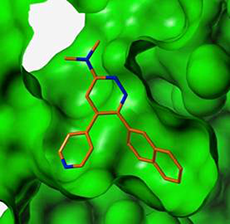 A new class of experimental drug-like small molecules showed great promise in targeting a brain enzyme to prevent early memory loss in Alzheimer’s disease. Developed in the laboratory of D. Martin Watterson, PhD, John G. Searle Professor of Molecular Biology and Biochemistry, the molecules halted memory loss and fixed damaged communication among brain cells in a mouse model of Alzheimer’s.
A new class of experimental drug-like small molecules showed great promise in targeting a brain enzyme to prevent early memory loss in Alzheimer’s disease. Developed in the laboratory of D. Martin Watterson, PhD, John G. Searle Professor of Molecular Biology and Biochemistry, the molecules halted memory loss and fixed damaged communication among brain cells in a mouse model of Alzheimer’s.
Northwestern Part of New Big Ten Cancer Research Consortium
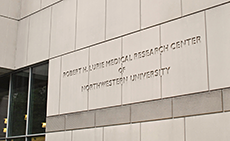
Meant to transform cancer research, a group of 11 schools formed a collaboration to leverage the scientific and clinical expertise of individual institutions. Newly developed clinical trials will be linked to molecular diagnostics, enabling researchers to understand what drives the cancers to grow and what might be done to stop them from growing. The consortium will also leverage geographical locations and existing relationships among cancer centers.
Study Shows Positive Results for New MS Therapy
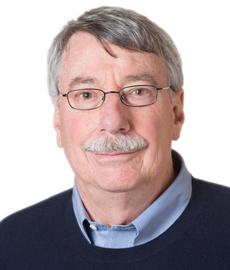
A phase 1 clinical trial for the first treatment to reset the immune system of multiple sclerosis patients showed that the therapy was safe and dramatically reduced immune system reactivity to myelin by 50 to 75 percent, according to co-senior author Stephen Miller, PhD, the Judy Gugenheim Research Professor of Microbiology-Immunology.
Lushniak Named Acting Surgeon General
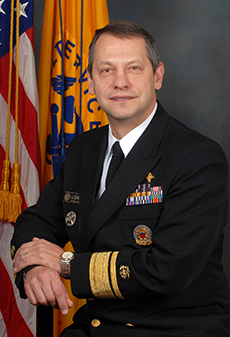
Alumnus Boris Lushniak, MD ’83, MPH, became “The Nation’s Doctor” in July, accepting the role of acting surgeon general following the departure of Vice Admiral Regina Benjamin, MD, MBA. In his new position, Rear Admiral Lushniak provides citizens with the best scientific information available on how to improve their health and the health of the nation. He also oversees the operations of the U.S. Public Health Service Commissioned Corps, the 6,700 uniformed health officers who serve in locations around the world to promote, protect and advance the health and safety of our nation.
Founders’ Day Kicks Off 155th Academic Year
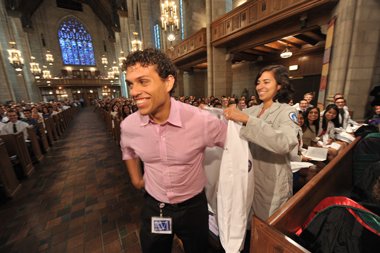
The official start to the academic year, the annual Founders’ Day Convocation was the culmination of a week and a half of events for new students, which included an Introduction to the Profession Module, team-building activities and dinners with the dean and faculty. At the ceremony, the incoming class recited the Declaration of Geneva and received their white coats.
First-Year Medical Students Arrive, Jump into Clinical Experiences
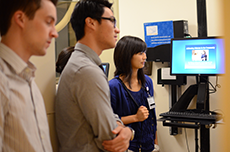
In August, the Class of 2017 arrived on campus and before starting classes, learned about the curriculum, interviewed patients and shadowed healthcare professionals during Arrival Week and the Introduction to the Profession Module. As the week came to an end, they attended the Feinberg Student-Faculty Dinner, where they met the professors and administrators that they will be interacting with over the next four years.
New Test May Help Reveal Early-Onset Dementia
 Simple tests that measure the ability to recognize individuals such as Albert Einstein, Bill Gates or Oprah Winfrey may help doctors identify early dementia in those 40 to 65 years of age. The study, published in the August issue of Neurology, was conducted by lead author Tamar Gefen, a doctoral candidate in neuropsychology at the Cognitive Neurology and Alzheimer’s Disease Center.
Simple tests that measure the ability to recognize individuals such as Albert Einstein, Bill Gates or Oprah Winfrey may help doctors identify early dementia in those 40 to 65 years of age. The study, published in the August issue of Neurology, was conducted by lead author Tamar Gefen, a doctoral candidate in neuropsychology at the Cognitive Neurology and Alzheimer’s Disease Center.
Mirkin Named “Nobel-Class” Citation Laureate
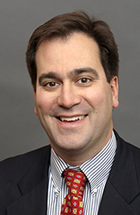
Northwestern University nanoscientist Chad A. Mirkin, PhD, was named a 2013 Thomson Reuters Citation Laureate in the annual pre-Nobel Prize “Thomson Reuters Predicts Nobel Laureates” study. Having accurately forecast 27 Nobel Prize winners since its inception in 2002, the study mines scientific research citations to identify the most influential scientists in the fields of chemistry, physics, medicine and economics. Mirkin, a leader in nanotechnology research and its application, was recognized for his contributions to DNA nanotechnology.
Pandolfino Appointed Chief of Gastroenterology and Hepatology
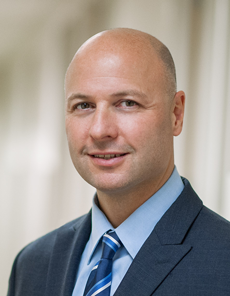
In September, John E. Pandolfino, MD, professor of Medicine, was appointed the Hans Popper Professor and chief of Gastroenterology-Hepatology. An internationally recognized gastroenterologist, Dr. Pandolfino specializes in esophageal disorders. He and his colleagues in the interdepartmental Esophageal Center have built one of the pre-eminent gastroenterology programs in the world for research and the clinical care of patients with esophageal disorders.
Talented Group of New PhD Students Arrives on Campus
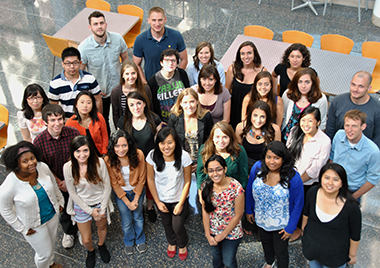
More than 70 PhD students arrived on the Chicago campus to join the Driskill Graduate Program in the Life Sciences, Northwestern University Interdepartmental Neuroscience Program, Medical Scientist Training Program, Clinical Psychology PhD program, Doctor of Physical Therapy/PhD program, and the Health Sciences Integrated PhD Program.
Northwestern Memorial HealthCare and Northwestern Medical Faculty Foundation Close Affiliation Agreement
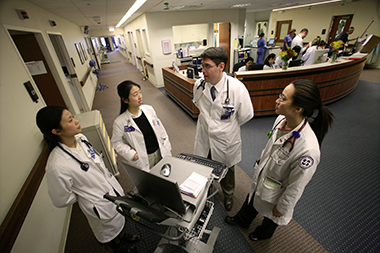
As the primary faculty practice for Feinberg, Northwestern Medical Faculty Foundation will join Northwestern Memorial Physician’s Group and Chicago Lakeshore Medical Associates to form Northwestern Medical Group, one of Chicago’s largest medical practices, with more than 1,000 physicians and other healthcare professionals. The new health system will be able to better organize care across the inpatient, diagnostic and physician office environments.
Overhauling Confusing Prescription Medicine Instructions
 Northwestern Medicine, Walgreens, Alliance of Chicago community health centers and Merck collaborated on a study with the goal of providing clear instructions on prescription medicine labels so patients don’t make mistakes and overcomplicate taking their daily medications. Michael Wolf, PhD, MPH, professor of Medicine, lead the project. The results could prompt change and launch a new national standard in the way prescription labels are written.
Northwestern Medicine, Walgreens, Alliance of Chicago community health centers and Merck collaborated on a study with the goal of providing clear instructions on prescription medicine labels so patients don’t make mistakes and overcomplicate taking their daily medications. Michael Wolf, PhD, MPH, professor of Medicine, lead the project. The results could prompt change and launch a new national standard in the way prescription labels are written.
Ion Channel Expert to Head Pharmacology
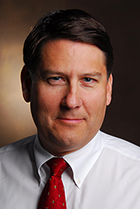
In October, Alfred L. George Jr., MD, an internationally regarded leader of diseases caused by the dysfunction of ion channels, was named the Magerstadt Professor of Pharmacology and chair of the Department of Pharmacology effective March 2014. Dr. George will also direct a new Center for Pharmacogenomics to advance Northwestern Medicine’s entry into personalized medicine.
Putting Lupus in Permanent Remission
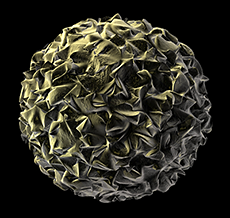
Northwestern Medicine scientists successfully tested a nontoxic therapy that suppresses lupus in blood samples of people with the autoimmune disease, marking a positive step toward developing a vaccine-like therapy that could keep lupus in remission without the use of toxic drugs. Syamal Datta, MD, senior author of the study and a professor of Medicine-Rheumatology and Microbiology-Immunology has devoted more than 27 years to the field, focusing on the cloning of the T-cells that drive lupus autoimmunity.
Hanauer to Join Gastroenterology and Hepatology
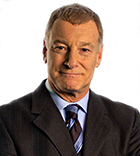
In November it was announced that Stephen B. Hanauer, MD, a distinguished physician-scientist and international leader in the treatment of inflammatory bowel disease, would join the medical school as the Clifford Joseph Barborka Professor of Medicine and the medical director of the Digestive Disease Center. Dr. Hanauer authored or co-authored hundreds of peer-reviewed journal articles, books, book chapters, monographs and editorials. He serves on the editorial board of numerous medical journals and designed and maintains the 6,000 patient Inflammatory Bowel Disease Registry.
Perkins+Will Selected as Architect for Biomedical Research Building

The new Biomedical Research Building will be located immediately east of the Lurie Medical Research Center on the site of the former Prentice Women’s Hospital. Northwestern plans to construct approximately 600,000 square feet of research space starting in 2015, with eventual buildout of approximately 1.2 million square feet. Construction of the new state-of-the-art center will create thousands of jobs, help find tomorrow’s cures and generate approximately $3.9 billion in economic activity in Chicago in the coming decade.






